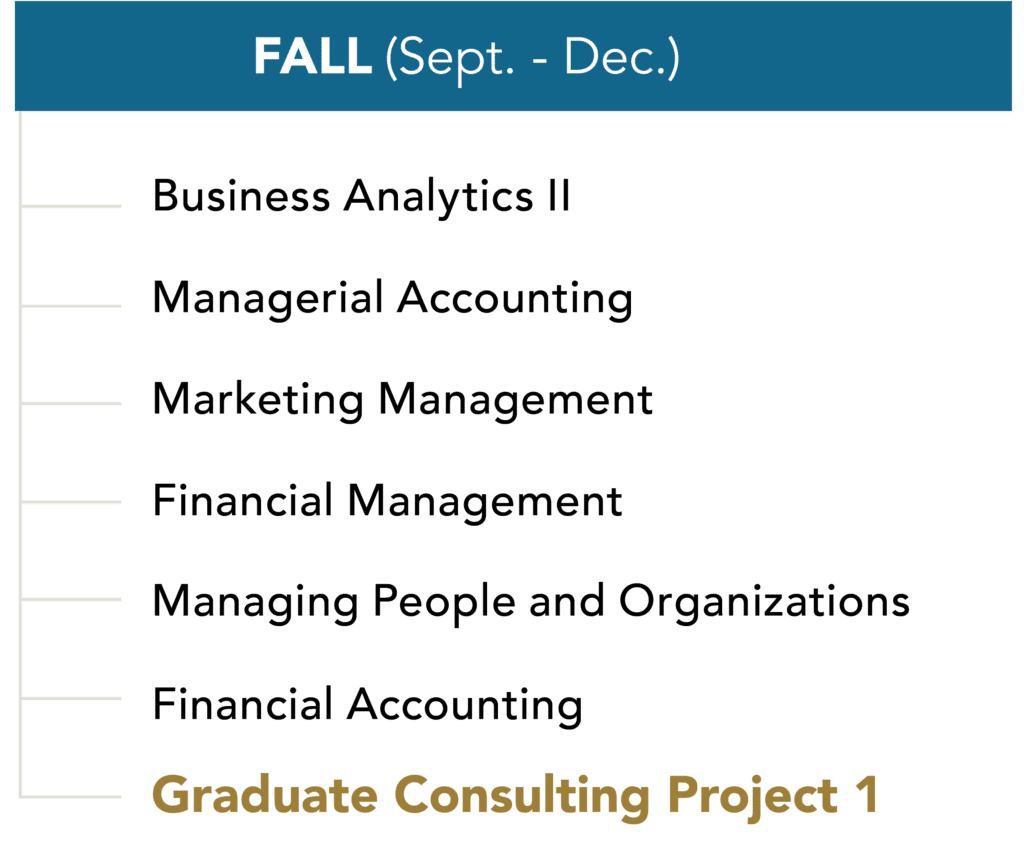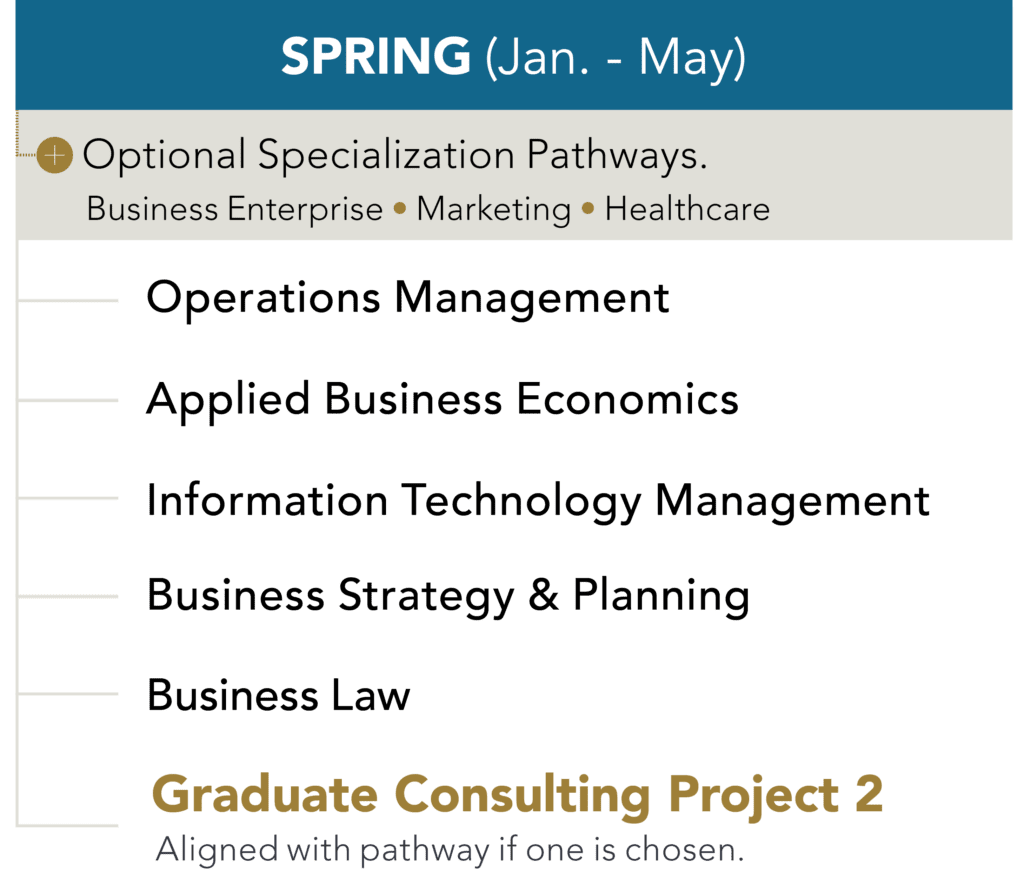Master of Science in Management Curriculum
Designed for those who didn’t major in business as undergraduates, the Wake Forest University School of Business’s Master of Science in Management (MSM) curriculum transforms critical-thinkers with their own specialized skill sets into leadership professionals ready to make a difference from day one. The curriculum emphasizes hands-on experience across a spectrum of industries and roles. It aims to turn your passion into a meaningful, organization-influencing profession and builds upon the knowledge you gained as an undergraduate. Based on the curriculum’s foundation and wealth of experiential opportunities, our MSM degree has been named by The Economist as one of the top management programs in the US.
The MSM curriculum requires students to have completed an undergraduate degree from an accredited school by the time they enroll. Coursework begins in summer with a thorough introduction to foundational business knowledge, before proceeding on to advanced concepts in finance, marketing, operations, business analytics, accounting, economics, information technology, ethics, organizational behavior, and leadership.
In the process, selecting a specialization track in Business Enterprise, Marketing, or Healthcare allows you to target your knowledge toward one facet of business operations. For hands-on experience, students work on Graduate Consulting Projects each semester and complete the program with a capstone. In total, the MSM curriculum covers 37 credit hours.
Goal of the MSM Curriculum
The global marketplace moves at a fast pace, and for launching a career, a theory-based curriculum only goes part of the way. The Wake Forest School of Business designed the MSM course offerings and 10-month structure to guide our graduates into a range of careers and industries:
- We strive to create a hands-on, immersive learning environment interested in your personal success through small class sizes, career coaching, and close involvement from our corporate contacts and alumni network.
- Through Graduate Consulting Projects (GCP), you’ll have multiple chances to gain real-world experience and contribute your knowledge toward existing corporate issues before you graduate, showing you’re ready to excel from the get-go.
- We ensure all students acquire a solid base in business concepts from the start, beginning with a five-week introductory module that sets the tone and pace for the rest of the MSM program.
- Graduates interested in pursuing additional credentials can apply the knowledge and credits acquired through the MSM program toward earning an MBA in just 12 months through the Wake Forest School of Business MBA Advantage.
Curriculum at a Glance
Summer Semester

This five-week session sets you up for success with a series of graduate-level introductory business courses. At the same time, all students are expected to start exploring their career interests in relation to their management goals and undergraduate knowledge.
Business Analytics I (1.5 Credit Hours)
With course content varying with the semester, this class introduces current topics in management that you’ll then explore in greater depth throughout the rest of the MSM curriculum.
Business Communications (1.5 Credit Hours)
Effective leaders know how to engage and convince others. Helping you refine these skills further, this course focuses on key business writing and speaking skills, particularly delivering oral presentations and creating convincing narratives.
Personal Branding & Career Management (1.5 Credit Hours)
Define your career while exploring various management pathways. Helping you gain lifelong career-management skills, this course goes over planning a trajectory, networking, self-promotion, and interviewing techniques to cultivate your personal brand and stand out in the workforce.
Problem Solving Mindset (1.5 Credit Hours)
To be a successful business leader, you need to be a master problem-solver. This course goes over addressing the needs of customers, stakeholders, employees, partners, and their surrounding communities and strategies to resolve a range of issues.
Fall Semester

With the introductory courses behind you, the Fall semester helps with strengthening key business and managerial competencies. Throughout the term, you’ll take advanced MSM courses in economics, marketing, and financial management and continue work on your Graduate Consulting Projects (GCP), based around or overlapping with a subject relevant to your selected specialization track.
Business Analytics II (1.5 Credit Hours)
Explore advanced business topics related to data management, statistics, and management science. In the process, you’ll gain insight into decision analysis, sampling distributions, confidence intervals, hypothesis testing, and modeling through simple and multiple regression.
Managerial Accounting (1.5 Credit Hours)
Learn how managers use accounting tools to make business decisions. Students become familiar with cost behavior, cost systems, relevant costing, and strategic cost analysis.
Marketing Management (3 Credit Hours)
This thorough introduction to high-level marketing concepts goes over a range of principles and techniques related to behavioral and quantitative analyses and illustrates real-world applications through case studies and simulations. You’ll become familiar with segmentation, targeting, and position strategies while exploring buyer behavior, consumer psychology, demand estimation, brand strategy, pricing, distribution channels, new product development, advertising, and sales promotions concepts.
Financial Management (3 Credit Hours)
This course trains students to think from a modern financial perspective, particularly where it comes to maximizing value and how finance overlaps with and affects other organizational aspects. You’ll learn or continue to hone skills involving financial modeling, valuation, capital acquisition, risk and return, capital structure, dividend policy, capital budgeting, and corporate restructuring.
Managing People and Organizations (3 Credit Hours)
Certain techniques, theories, and skills influence how an organization functions. This course introduces essential organizational behavior and leadership topics, including problem-solving, coaching, communication, influence strategies, motivation, conflict management, empowerment, delegation, team-building, and leading effective change.
Financial Accounting (1.5 Credit Hours)
The language of accounting and its general concepts run through all areas of business. This course explores it as both a communication method and decision-making strategy, all while covering key accounting concepts and principles.
Spring Semester

Delving more into real-world applications, this semester exposes you to common quandaries faced by managers regardless of industry or job function and gets you using your individual and managerial skills to resolve these issues. Students also take two electives to complete one of the three specialization tracks.
In the process, all students must complete a final capstone project (1.5 credit hours). Another experiential opportunity, you not only need to display your understanding of all topics introduced throughout the Master’s in Management curriculum, but you’re further expected to show how you’d use that knowledge to solve a real-world problem relevant to the global marketplace.
Operations Management (3.0 Credit Hours)
For remaining competitive in a global marketplace, operations management becomes key for creating and streamlining processes regarding the delivery of quality goods and services. This course touches on planning, process design, quality management, and supply chain management in relation to marketing, finance, and human resources.
Applied Business Economics (1.5 Credit Hours)
Focusing on microeconomic analytical skills and their application in management, this course covers allocating resources and value-improving decision-making, with emphasis on problem-solving skills and analytic applications.
Information Technology Management (1.5 Credit Hours)
Although businesses have dedicated information technology (IT) departments, technology influences every aspect of operation, including business models and how organizations generate value. This course serves as a primer for future business leaders to become familiar with key information technologies, particularly within the context of markets, ethics, and products.
Business Strategy & Planning (1.5 Credit Hours)
This course helps students understand how businesses are legally and ethically constructed and how the law factors into disputes. Coursework provides an overview of the US legal system, with an emphasis on property rights, business liabilities, and private-market regulations.
Business Law (1.5 Credit Hours)
Anyone managing or helping steer the direction of a business needs to understand key legal subjects, especially concerning property, contracts, torts, corporate governance, employment discrimination, sexual harassment, and government regulations. Beyond these targeted points, this course provides an overview of American law, including how the legal system works, its limits, and logic.
*For official curricular details, complete course descriptions, and any potential electives, please refer to the current edition of the School of Business Graduate Student Handbook.
Specialization Pathways

Students can replace their general electives with an optional specialized pathway with predesignated elective courses that align with their career goals and industry demands. These courses and projects provide networking and mentoring opportunities from business leaders and faculty.
Each pathway includes two predesignated electives that explore topics essential to the area of specialization. When combined with a pathway specific Graduate Consulting Project, students emerge better prepared for their career goals and able to meet industry demands.
Graduate Consulting Projects
In the business world, there’s no substitute for direct experience. Graduate Consulting Projects (GCP) are an integral part of the Master’s in Management curriculum. Designed to provide you with a world-class experiential learning opportunity, these projects give organizations the benefits of fresh ideas and solutions in business. Throughout the experience, you will:
- apply and reinforce course concepts;
- create actual business solutions in a collaborative, hands-on setting; and
- strengthen your skills, confidence, and experience.
The GCP experience is an extension of the classroom that gives you the opportunity to work with a “real-world” project and client. The projects begin at the start of the program with two elective courses, and by the spring semester, your designated team is working directly with a business sponsor-client. As a result, you further develop important professional skills while creating value for one of our corporate partners.
Learn More About the Master’s in Management Curriculum
Have questions about the MSM curriculum at Wake Forest or the program in general? Complete a request form, and we’ll follow up with additional information.

 336-758-5422
336-758-5422